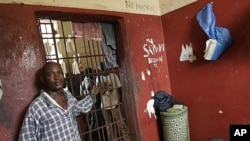Rights group Amnesty International is calling for reforms to Liberia's criminal justice system, to address what it says are severe overcrowding and inhumane living conditions in the country's prisons.
Amnesty International says conditions in Liberia's prisons are, in a word, "appalling." So much so, Amnesty says, that "they violate inmates' basic human rights."
Amnesty's Deputy Africa Director, Tawanda Hondura, says that on a recent visit to Liberia he saw as many as eight people crammed into dirty cells meant for two. "There is no proper ventilation, no proper lighting. Inmates are not provided with any bedding, so they have to make due with whatever they can find, mostly their clothes," she said. "The windows did not actually have covers, so people get wet during the rainy season, bitten by mosquitoes. At Block D in Monrovia Central Prison, people have to urinate and defecate in plastic bags at night and then throw those out whenever they get a chance."
Monrovia Central Prison, the country's largest, has a capacity of 300, however Hondura says it typically houses close to 1,000 inmates. He says inmates there build makeshift hammocks to avoid having to sleep practically standing up in the tiny cells.
Amnesty says the vast majority of these inmates have not been convicted of any crime. Hondura says more than 80 percent of Liberia's prison population are pre-trial detainees.
"The major problem that contributes to prison overcrowding is the criminal justice system, which had completely collapsed and which the government is slowly trying to rebuild. There are not enough magistrates or judges. There are not enough prosecutors. Sometimes people are put in prison but no attempt is made to prosecute them after, so you find people in prison awaiting trial for up to six, seven years," Hondura explains. "Which is entirely unacceptable."
Liberia is still struggling to recover from 14 years of unrest and civil war that ended in 2003.
A Liberian government spokesman, Cletus Sieh, tells VOA that the state of the prisons and the slow pace of the courts are key challenges, though he characterized Amnesty's report as "an exaggeration."
The report, he says, does not look at a newer prison in Zwedru in eastern Liberia that Sieh said has a recreation yard, proper bedding and a health facility.
The Justice Ministry, Sieh says, has begun hiring and training additional prosecutors and public defenders and the country's president, Ellen Johnson Sirleaf, has periodically given amnesty to detainees held on minor offenses in an effort to reduce overcrowding.
Amnesty visited four of the country's 15 prisons, none of which it said had running water, adequate sanitation or health care facilities. Amnesty said malaria, skin infections and eye problems are often left untreated and that inmates are transferred to hospitals only in emergencies.
Amnesty's Hondura says inmates can suffer permanent damage to their physical and mental health. "A lot of people complained about depression. There were many people who had attempted to commit suicide while in prison and were punished for their attempts," she noted.
Amnesty applauds recent steps taken by the Liberian government and international partners to improve living conditions but says much more must be done.
Rights Group Condemn Liberia's Prison Conditions




